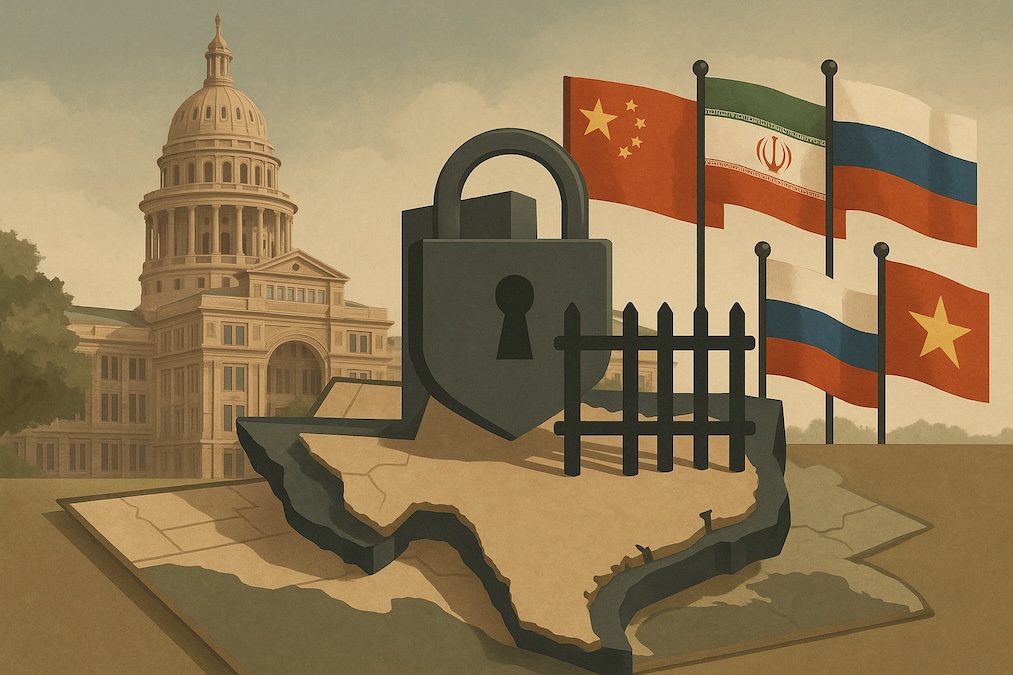A new law in Texas bars people and companies from several foreign countries from purchasing land in the state, part of a national trend linking property ownership to security concerns.
Senate Bill 17 — which took effect Sept. 1 — prohibits individuals and entities from China, Russia, Iran, North Korea and other countries designated by the governor from buying land or certain property in Texas.
The law also limits some foreign nationals from leasing homes or apartments for more than a year, local outlet KERA News first reported.
Stiff criminal penalties
Gov. Greg Abbott signed the measure into law and framed it as a safeguard against foreign influence.
“It is very simple. Hostile foreign adversaries like China, Russia, Iran, and North Korea, as well as foreign terrorist organizations like Tren de Aragua, must not be allowed to own land in Texas,” Abbott said in a press release. “They should not be allowed access to our critical infrastructure, and they may not be allowed to exploit our border.
“Stiff, criminal penalties will be inflicted on those who violate these laws.”
The legislation was authored by Republican Sen. Lois Kolkhorst, who said it was crafted to withstand constitutional challenges.
“This legislation is different [than similar, earlier legislation], better, and more constitutionally sound and predicated on national security issues,” Kolkhorst told KERA News. “In the interim, I asked my staff to work with the best legal minds to craft a constitutionally sound but strict bill to protect Texas.”
Kolkhorst cited public outcry over a Chinese company with ties to the Chinese Communist Party purchasing 140,000 acres near Laughlin Air Force Base as a catalyst for the bill.
Civil rights groups push back
Lt. Gov. Dan Patrick also supported the measure, calling it “common sense and good state policy.”
“Preventing private property from being sold to entities from adversarial nations is a basic tenet of national security,” Patrick said. “Many Texans have been increasingly concerned by this growing practice over the last few years.”
Civil rights groups, however, argue the law unfairly targets immigrants and Asian communities.
In May, the ACLU of Texas said SB 17 would undermine equal protection rights.
“S.B. 17 denies people meaningful access to housing and business opportunities,” said Sarah Cruz, policy and advocacy strategist for immigrants’ rights,” the organization said. “The bill would promote racial profiling against citizens and non-citizens wanting to purchase or lease property, as well as cause sellers to discriminate against potential buyers.”
The Chinese American Legal Defense Alliance filed a lawsuit on behalf of three visa holders from China, but the case was dismissed after a judge ruled the plaintiffs were not directly affected by the law.
Community organizer Jason Yuan criticized the measure, saying it should be renamed “The Chinese Exclusion Act of 2025.”
Texas is home to at least 120,000 people born in mainland China, according to 2023 data published by NPR.
Nationwide trend
The state joins more than two dozen others — including Florida — that have enacted restrictions on foreign property ownership since 2021, with many targeting China.
The surge in legislation coincided with heightened U.S.-China tensions, including the 2023 incident involving a Chinese surveillance balloon.
Supporters argue the measures protect land, food and water resources, while opponents say they fuel discrimination.
“This is a matter of national security. Texas must act now to protect our land, food sources, water and natural resources,” Kolkhorst said.





